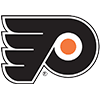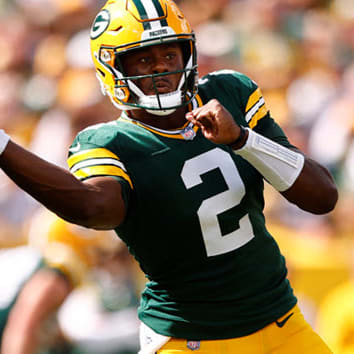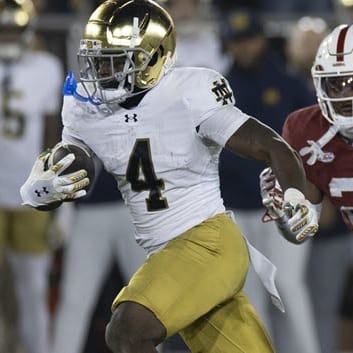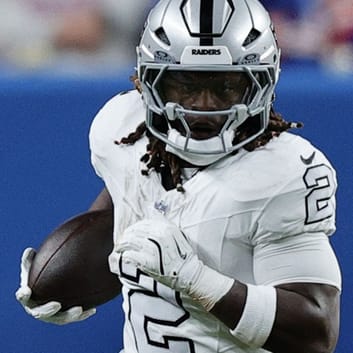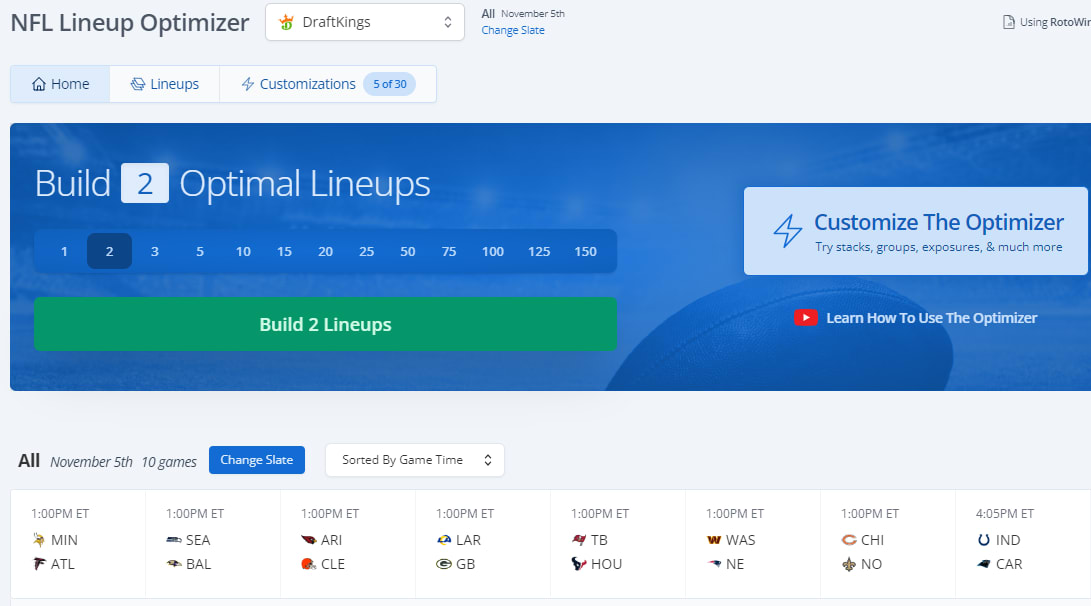FanDuel is one of two titans in the DFS industry, offering a wide variety of contest types, prize structures and price points. The quantity of options seems to grow each season, but the core product mostly remains the same: large-field tournaments with top-heavy payout structures. These contests offer the allure of turning $3 or $10 or $20 into tens or hundreds of thousands, though it requires a near-perfect lineup to finish at the top of a massive field.
Once known for its use of kickers as well as lineups that locked at the start of the first game, FanDuel now offers late swap and also has joined the #bankickers movement. The basic salary-cap game gives us a $60,000 budget to fill out a roster comprised of 1 QB, 2 RBs, 3 WRs, 1 TE, 1 FLEX and 1 D/ST.
Player prices land in the following ranges: $6,000-10,000 for QB; $4,500-11,000 for RB; $4,500-9,500 for WR; $4,000-8,000 for TE; $3,000-5,500 for D/ST. Of course, those ranges include stuff like Todd Gurley or Patrick Mahomes during a hot streak; the normal price for a star player would be around $8,000-9,000 for a QB or $8,500-9,500 for a RB.
A $60,000 budget divided by nine spots gives us $6,667 per player, though it jumps a bit higher to around $7,000 for position players after we account for the low cost of a team defense. FanDuel's pricing is considered "softer" than most other DFS sites, allowing for lineups littered with superstars. For example, my main tournament lineup from Week 17 of 2018 included Mahomes, Tyreek Hill, Travis Kelce, JuJu Smith-Schuster and Mike Evans. I went cheap at running back and D/ST to make it work, deploying the stars-and-scrubs approach that's widely seen on FanDuel.
Most weeks it's a safe bet that any decent DFS lineup optimizer will spit out a top-heavy, star-laden roster construction for cash games on FanDuel. I often find this to be the best approach for tournaments as well, but there's more variability on what makes sense week to week.
Cash Games vs. Tournaments (GPPs)
The term "cash game" covers a few different types of contests, including head-to-heads, double-ups and 50/50s. What all these games have in common is relatively good odds to make a small amount of money. The goal is simply to create a lineup with the highest mean projection — a.k.a. the one you expect to score the most points — without worrying about interplayer correlations or which players will be over/under-owned by the rest of the field.
In fact, it's often a sign we've made a mistake if one of our players has a single-digit ownership percentage in a 50/50 or double-up. That's not to say our lineup should strictly be based on ownership expectations, but there is some real value in the wisdom of the crowd, especially as a learning resource for anyone new to DFS. Generally speaking, the players with the highest ownership rates in cash games are the same ones with the best odds to outperform their respective salaries. Studying these ownership rates at the end of the week is a good way to develop an understanding of the thought processes of more experienced opponents.
In a 50-50, half the participants will receive a payout, with the highest-scoring lineup receiving the same amount of money as a lineup that finished in the 51st percentile. Each prize is a bit less than double the entry fee, as the site takes out a "rake" of 10-15 percent. A double-up contest does exactly what its name implies, but it only pays out 42-46 percent of the field to leave room for the rake.
For those chasing a bigger payday at slimmer odds, large-field tournaments — sometimes referred to as Guaranteed Prize Pool (GPPs) — are the way to go. These are the main attraction on FanDuel and most other daily fantasy sites, with descending prize structures that allow for huge rewards in the 99th percentile, though they only pay out the top 20-25 percent of lineups.
Tournament strategy demands a more risk-tolerant approach, encouraging the use of multiple players from a single real-life game (a.k.a. "game stacking"). With no financial difference between a mediocre lineup and a lousy one, it almost always makes sense to use at least one pass catcher from the same team as your quarterback. There's also a good argument for using a wide receiver or tight end from the other side of that game, hoping to take advantage of a shootout that forces both teams to continue passing throughout the second half. Long story short, we're focused on the upside scenario without giving much thought to the downside if things don't work out.
There's also an element of game theory to tournament strategy, as the relative value of a huge individual performance isn't nearly as big if the player shows up in a high percentage of our opponents' lineups. For FanDuel in particular, this might push us toward a balanced roster over the stars-and-scrubs approach when we expect the latter to be far more popular among our opponents. If everyone else wants to use Saquon Barkley plus the trendy cheap RB of the week, we might counter with a mid-range duo along the lines of Mark Ingram and Marlon Mack.
This consideration is particularly important on FanDuel, where the pricing algorithm favors superstars and is rather slow to respond to injuries and role changes. A typical week will feature a handful of high-owned superstars ($8,000+) combined with a handful of high-owned bargain players ($4,500-6,000). This leads to an awful lot of lineups looking the same, making it easy to differentiate if we can find a lineup that utilizes a bunch of players in that overlooked 6-8k range.
Ownership rates aren't something to worry about when first playing daily fantasy, but they're a worthwhile consideration once you have a strong grip on the basics. With more experience comes better knowledge about which players will be popular choices in a given week.
The Scoring System
FanDuel scoring is half-PPR with 25/10 yardage and 4/6 touchdowns — a pretty typical fantasy setup that splits the difference between those who prefer PPR and those who prefer standard scoring. Unlike their main competitor, DraftKings, FanDuel doesn't offer bonuses for reaching specific benchmarks for yardage (e.g. 100 rushing/receiving or 300 passing).
This makes touchdowns relatively more valuable on FD, whereas DK's scoring system places a premium on catches and yards. The FD setup also increases QB scoring relative to RB/WR/TE scoring, though the difference is accounted for in the pricing algorithm, so it still makes sense to use a discount quarterback in many cases. In practical terms, the FD scoring would tend to favor medium-volume players on teams that put up a lot of points, while DK works better for volume hogs even if the context isn't great for those opportunities to be converted into touchdowns.
Let's take a look at two receiving lines to illustrate the difference between FD and DK:
10 catches for 110 yards and no TDs = 16 points on FD; 24 points on DK
4 catches for 50 yards and two TDs = 19 points on FD; 21 points on DK
Players always have higher raw totals on DK, but the second line (4-50-2) is far more valuable on FD in relative terms. Here are the specifics of FanDuel's scoring system:
| Offense | Defense |
| Rushing yards made=0.1pts | Sacks=1pt |
| Rushing touchdowns=6pts | Opponent-fumbles recovered=2pts |
| Passing yards=0.04pts | Return touchdowns=6pts |
| Passing touchdowns=4pts | Extra Point Return=2pts |
| Interceptions=-1pt | Safeties=2pts |
| Receiving yards=0.1pts | Blocked Punt/Kick=2pts |
| Receiving touchdowns=6pts | Interceptions made=2pts |
| Receptions=0.5pts | 0 points allowed=10pts |
| Kickoff return touchdowns=6pts | 1-6 points allowed=7pts |
| Punt return touchdowns=6pts | 7-13 points allowed=4pts |
| Fumbles lost=-2pts | 14-20 points allowed=1pt |
| Own fumbles recovered touchdowns=6pts | 21-27 points allowed=0pts |
| Two-point conversions scored=2pts | 28-34 points allowed=-1pt |
| Two-point conversion passes=2pts | 35+ points allowed=-4pts |
| Field-goals from 0-39 yards=3pts | |
| Field-goals from 40-49 yards=4pts | |
| Field-goals from 50+ yards=5pts | |
| Extra-point conversions=1pt |

















